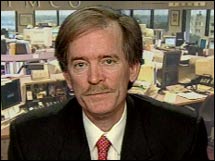NEW YORK (CNN/Money) -
When somebody as smart as Bill Gross warns of trouble in the economy, it's usually worth a listen.

Though analysts thought his latest warnings, reported on Thursday, were on the money in many ways, their immediacy may have been overstated. They sure hope so, anyway.
Gross, manager of the PIMCO bond fund, the world's biggest, told the Financial Times that the global economy was more vulnerable to a downturn than at any time in decades.
"Too much debt, geopolitical risk and several bubbles have created a very unstable environment which can turn any minute," Gross reportedly said. "More than any point in the past 20 or 30 years, there's potential for a reversal."
Gross's litany of worries included, among other things:
- U.S. consumers -- whose spending makes up more than two-thirds of gross domestic product (GDP) in the world's largest economy -- are too deeply in debt and vulnerable to interest-rate increases.
- The U.S. government is also too deeply in debt.
- Oh, and there's too much debt in Japan, the world's second-largest economy, too.
- There's a housing bubble in the United Kingdom.
- There's a bubble in commodity prices, too.
- The U.S. dollar is overvalued by 20 percent, propped up by an inflow of foreign capital that can be reversed at any time.
- Hedge funds and banks are taking advantage of low short-term interest rates to indulge in the "carry trade," in which money is borrowed at cheap short-term rates and then invested in other stuff, leaving all such investors vulnerable to a pop in rates.
Little of that sounds crazy to other observers. A recent survey of nearly 200 chief financial officers by Duke University's Fuqua School of Business found many of them worrying that terrorism, inflation and higher interest rates would hurt business spending and hiring in the coming year.
|
 |  | Year |  | Combined deficits |  | 1994 | 4.6% |  | 1995 | 3.7% |  | 1996 | 2.9% |  | 1997 | 1.8% |  | 1998 | 1.5% |  | 1999 | 1.8% |  | 2000 | 1.8% |  | 2001 | 2.6% |  | 2002 | 6.1% |  | 2003 | 8.4% |
|  |  |
| Sources: Bureau of Economic Analysis, Congressional Budget Office, CNN/Money |
|
"The CFOs are telling us that there are growing risks to a continued recovery," Duke finance professor Campbell Harvey said Thursday. "Our analysis of this quarter's survey suggests the economic situation is growing more fragile."
Gross' warnings are also likely music to the ears of other prominent bears, such as Morgan Stanley chief global economist Stephen Roach, who's been making similar comments for years. Roach warned this week about "the accident-prone character of the global economy" and said investors seemed unprepared for the worst.
"Over the 2004-05 interval, looming bond market perils appear to pose the most serious challenges for [leveraged] consumers and property markets -- possibly even resulting in a new deflation scare," Roach wrote in a note to clients on Monday.
For now, runaway inflation is the monster that's scaring everybody and could make the bears' most dire predictions come true. Though the Federal Reserve believes inflation is relatively tame, giving it the luxury of raising rates very slowly, many investors worry the central bank is woefully behind the curve.
If they're right, then a surge in prices will force the Fed to jack up rates more quickly than it wants, potentially slamming practitioners of the "carry trade," U.S. homeowners, consumers with credit card debt and a host of other rate-sensitive victims.
Pain to come -- but not just yet
Fortunately, though, that's still not the consensus forecast.
And though consumer and government debt, the U.S. trade imbalance, the threat of terrorism and other potential headaches are patently obvious, most analysts still believe they will be offset -- at least for the next several months -- by a surge in global economic growth that's already in train.
| Related stories
|

|
|
|
|
"Obviously, the economy ails from important secular imbalances; there's a lot to be concerned about," said Carlos Asilis, portfolio manager with the hedge fund Vega Asset Management. "But the cyclical forces indicate that, at least over the coming quarters, visibility is high."
"So long as inflation doesn't become too big of a problem, I don't see why we are going to get a negative surprise this year," he added.
Later years are a different story. Asilis believes higher interest rates could indeed come to haunt overly leveraged consumers by 2006. Others believe the pain could come as soon as 2005.
Meanwhile, higher rates will drive stocks' price-to-earnings ratios down. Combined with the other headwinds Gross describes, some analysts worry that U.S. stock markets are in for a return to the doldrums that characterized the 1966-82 secular bear market.
"The cheerleaders talk about the economy growing, but the economy grew at 7 percent from 1966 to 1982, while stocks went nowhere because valuations were too optimistic," said Jeffrey Saut, chief investment strategist at Raymond James. "And they're optimistic now, by historic measurements."
The P/E ratio for the S&P 500 is still near its peak at the end of the 1980s-1990s bull market, Saut pointed out, and that may need to unwind before stocks can rocket upwards again.
"Yet you can make good money in that environment," Saut said. "It just takes a different strategy; you try to hold a core bunch of stocks you think are in secular bull markets and trade at inflection points."

|

